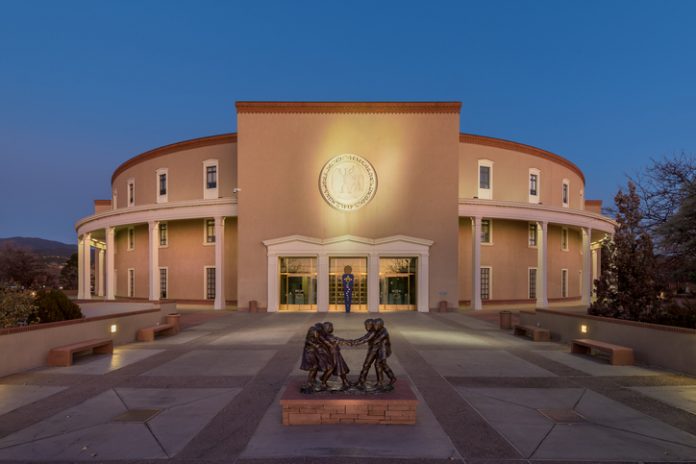Already reeling from the Biden administration’s “pause” on new oil and gas leases on federal land, New Mexico’s oil and gas operators may soon be facing more stringent state rules aimed at curbing ozone levels in several energy-producing counties.
New Mexico’s Environmental Department (NMED) unveiled its final ozone regulatory proposal on April 29, updating less-stringent draft rules it had issued last summer.
Rules Target O&G Tech
The new rules target oil and gas industry equipment that emits volatile organic compounds (VOCs) and nitrogen oxides (NOX) during operation. Those two chemicals can combine to form ground-level ozone.
The rules will apply to 50,000 wells and other oil and natural gas sites on federal, state, and private land in the counties suffering from high ozone levels, including Chaves, Dona Ana, Eddy, Lea, Rio Arriba, Sandoval, San Juan, and Valencia.
If adopted as currently written, the rules will force the industry to install new control devices and enhanced leak detection technology, as well as meet tighter compliance deadlines.
Originally, low-emitting “stripper wells” and other sites were exempt from the rule, but after environmental groups complained, they were added to the final proposal.
NMED estimates the new rules, expected to take effect in spring of 2022, will reduce ozone-forming emissions by about 129,000 tons each year. Operators failing to comply will face stiff fines.
Rules Threaten NM Economy
The ozone proposal comes at a time when the future of fossil-fuel development in New Mexico is in doubt.
President Joe Biden’s pause on oil and gas development on federal land threatens to cripple New Mexico’s economy. Oil and gas extraction in the hydrocarbon-rich Permian Basin, which New Mexico shares with Texas, has been a major source of jobs and tax revenues.
At the beginning of the year, the industry employed around 100,000 workers in the state, and its tax revenues put $2.8 billion into the state’s coffers, according to the New Mexico Oil and Gas Association (NMOGA).
Those revenues accounted for over a third of New Mexico’s budget.
New Mexico’s two Democratic Sens. Martin Heinrich and Ben Ray Lujan, sent a letter to White House climate advisor Gina McCarthy in early March, expressing concern about the impact of potential ban on new oil and gas production on federal lands in their state.
“We write to follow up on President Biden’s Executive Order 14008 addressing the climate crisis,” said the letter from Heinrich and Lujan. “[Although a] leasing pause is fully appropriate in the new Biden administration, an extended and indefinite suspension would have significant impacts on our workforce and state funding for education and creates unnecessary uncertainty for New Mexico’s state and local budgets.”
‘Destroy the Oil and Gas Industry’
Against its residents’ interests, New Mexico’s progressive government is collaborating with the Biden administration to destroy the oil and gas industry, says Jay Lehr, Ph.D., senior policy analyst with the International Climate Science Coalition.
“There is an all-out effort by the Biden administration and its political allies to destroy the oil and gas industry in New Mexico and everywhere else,” said Lehr. “Since New Mexico’s Permian Basin is one of the United States’ best energy producers, this will hurt its citizens the most.”
The ozone rules are just the latest in a long train of abuses placed on resource developers in New Mexico, says Howard Hutchinson, executive director of the Coalition of Arizona/New Mexico Counties.
“In the 1990s, emboldened by their success in destroying New Mexico’s timber industry, environmental organizations embarked on campaigns to take out ranching, mining, and irrigated farming,” Hutchinson said. “Every year over the past three decades, New Mexico’s legislature and federal and state agencies have cranked the regulatory ratchet on these industries.”
“Now the hungry reptile is going after the biggest prey of all, the oil and gas industry,” said Hutchinson. “As New Mexico adopts a more progressive agenda, our state falls further behind our western neighbors in population growth and other key measures of success.”
Bonner R. Cohen, Ph. D., (bcohen@nationalcenter.org) is a senior fellow at the National Center for Public Policy Research and a senior policy analyst with the Committee for a Constructive Tomorrow (CFACT).
Internet Info:
Bonner R. Cohen, “Green New Deal backers balk at Biden fracking ban on federal land ,” CFACT, March 16, 2021; https://www.cfact.org/2021/03/16/green-new-deal-backers-balk-at-biden-fracking-ban-on-federal-land/


























